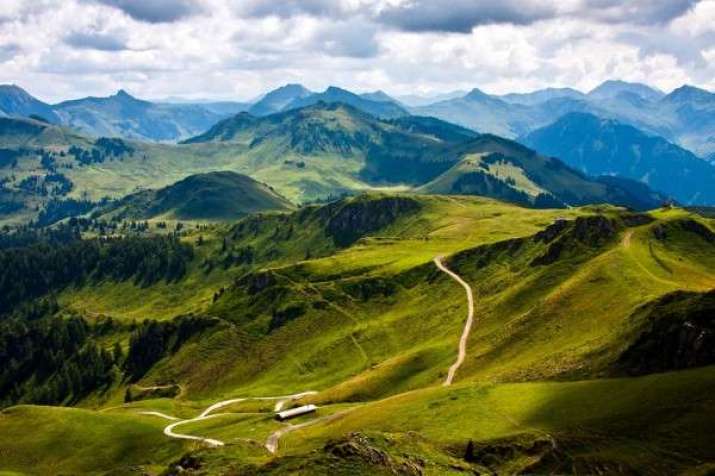NEWS
Buddhist Monks in Ukraine Relocate to the Carpathian Mountains to Escape War in Donbass
 The Carpathian Mountains in Ukraine. From destinations.com.ua
The Carpathian Mountains in Ukraine. From destinations.com.uaBuddhist monks from the Donbass region of eastern Ukraine are relocating to a quiet village in the Carpathian Mountains to escape the ongoing conflict in the region. However, accustomed to a peaceful and reclusive lifestyle, the local Orthodox Christian population have mixed feelings about the arrival of their new neighbors.
“[The] locals do not understand us because they think very superficially about things like faith,” said Buddhist monk Vasyl Nastyuk. “They do not perceive us well because they think it is something totally different.” (Euromaidan Press)
The small community of Buddhists, however, is hoping that locals just need time to accept the presence of monks in the region.
One of the local residents, Ivan Bondaryk, told Euromaidan Press, an independent online English-language newspaper launched in 2014 by Ukrainian volunteers, that he is happy to see the new arrivals, as he has watched many of his fellow villagers pack up their belongings and move on in search of a better life elsewhere. “They have bought the house. I’m happy they have come here,” he said. “Not many residents remain in the village, earlier there were 12 houses, now only four.”
#Buddhist Monks Settle in #Ukraine's Carpathian Mountains After Fleeing #War pic.twitter.com/S4ETiZbJrb
— UATV English (@UATV_en) January 4, 2018
News report on the monks by Euromaidan Press. From twitter.com
The war in Donbass, a region spanning the Donetsk and Luhansk oblasts of Ukraine, is an armed conflict between the self-declared Donetsk People's Republic and Luhansk People's Republic (DPR and LPR respectively), and the Ukrainian government. The conflict has escalated from a series of pro-Russian and anti-government protests in Donetsk and Luhansk, in the wake of the Euromaidan movement—a wave of pro-European demonstrations concentrated in the capital of Kiev that followed a series of pro-Russian decisions of the Ukrainian government and the annexation of Crimea by the Russian Federation—and the 2014 Ukrainian Revolution.
The monks moved to the village of Krivopillya to escape the spreading violence: “Everything that happened is connected with the Donbas and with war. Everything has started from there. I am from Donetsk, for example,” said Buddhist monk Serhey Filonenko. (Euromaidan Press)
Interest in Buddhism in Ukraine first arose in the 19th century, although the country was exposed to Buddhism, at least on a superficial level, for many centuries prior due to contact between Ukrainian Cossacks and Kalmyks who profess Buddhism. The growth of Buddhism in Ukraine, however, was stunted by the Soviet government, which banned all religious teachings that differed from Soviet ideology. In the late 1980s, at the end of the Soviet era, interest in Buddhism flourished once again, with the first public Buddhist teachings taking place in 1989. An estimated 5,000 people practice Buddhism in Ukraine today.
In 1991, there were three registered Buddhist communities in the eastern regions of Donetsk, Kharkov, and Lugansk. At present, Ukraine is home to 58 formally registered Buddhist communities, but according to religious scientists there are probably 100 communities in Ukraine. The largest Buddhist communities in Ukraine belong to the Tibetan tradition. Most widespread are Karma Kagyu communities, of the Kagyu school. Besides the Tibetan Buddhist schools, Ukraine also has practitioners of Zen Buddhism, Nichiren Buddhists from the Nippondzan Myohoji Monastic Order, who are currently building a Stupa in Lugansk, and Vipassana meditation followers of S. N. Goenka, a Burmese-Indian teacher.
See more
Donbas Buddhist monks settle in Ukraine’s Carpathian Mountains after fleeing war (Euromaidan Press)
First Buddha Stupa in Ukraine, Pankovka, Lugansk (Facebook)
History of Buddhism in Ukraine (Encyclopedia of Buddhism)
How Buddhism Left the Donbas (Ukrainian Institute of Strategies of Global Development and Adaptation)
Related news from Buddhistdoor Global
Russian Buddhists Offer Prayers in Response to St. Petersburg Metro Attack
Dalai Lama Joins Russian and Buddhist Scholars for Historic Dialogue in New Delhi
Moscow’s State Museum of Oriental Art Exhibiting Biggest Buddhist Art Collection in Russia
New Wildlife Reserve Could Help Save China’s Big Cats
Related features from Buddhistdoor Global
From a trans-personal place on Buddhism in Ukraine: a post-Soviet and post-colonial Dharma of creativity and liberation from the dogmas
Mount Kailas: Natural Consciousness of Cultural Memories, Places, and Time
Tuva: Sacred Land of Turkic Shamanism and Tibetan Buddhism
International Conference in Tuva Marks Revival of Buddhism in Central Asia
Russia’s Golden Triangle of Buddhism














